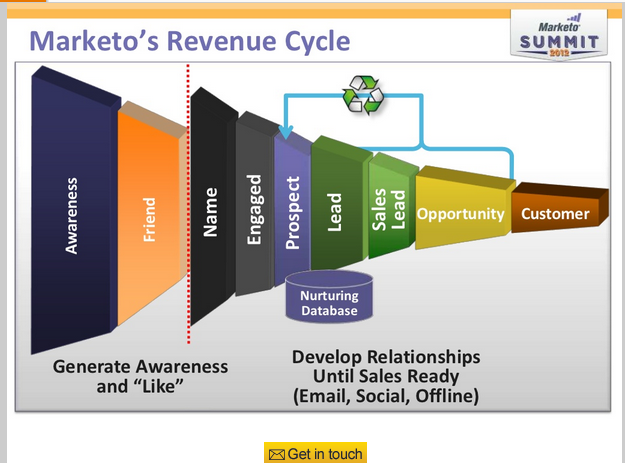Apologies to all those to whom this is already well known. But, I know many of you have never hired a head of marketing before. And as soon as you get your MSP (Minimum Sellable Product) out the door, and you’ve got your first 10 customers under your belt — you’re probably going to want to hire a VP or Head of Marketing to help you get more leads in, manage the process, and help get the word out.
All good stuff.
Let me just give you one tip. There are basically 2 types of SaaS and business web marketers. And if you hire the wrong type — the more common type — then instead of more customers, you may end up with just a bunch of Blue Pens with your logo on them.
Why’s that?
Well, for SaaS companies, marketing broadly speaking breaks into two species — Corporate Marketing and Demand Generation. Traditionally, with the larger software companies, and before the rise of the Internet as a true lead generation engine for B2B sales — Corporate Marketing Was King. And demand generation were the junior guys and gals in the backroom.
And because of this, you’re going to find the Web Leaders all spit out a ton of Corporate Marketers. At the end of the day, Corporate Marketing is all about protecting and reinforcing the brand once you are Way Past Scale. Corporate Marketing at Google, at Adobe, at Salesforce isn’t about getting the brand out there. Everyone that might buy has already heard of the brand, for the most part. Corporate Marketing is all about reinforcing positive images on the brand and product before a buying decision (to accelerate it and increase the odds of closing), and post-buying, so that you’ll buy more.
You’ll buy billboards and ultimately TV ads:

And maybe lots of blue logo pens.
Because once you have a brand, even just a mini-brand — this works. It’s just that brand marketing is very expensive in the early days — and frustratingly, generates zero leads. So it seems to have zero ROI. I can pretty much guarantee you the billboard above generated $0 in direct revenue for us. It’s worth it though, because EchoSign and the web services group are past $50m in ARR. Which means there’s a real brand to manage. Not an epic one yet, but a real one. And then you really do want to invest a lot in the brand. And as your revenues grow, it gets cheaper, because it’s a smaller and smaller % of your overall revenue. Eventually, you can buy billboards. And then eventually, maybe even TV if you want. And this stuff, later, becomes great. It reinforces your brand in the mind of the buyer, and when they are ready to buy … they’ll already know who you are, and hopefully, have some positive pre-conceptions.
Once you have a dominant brand, leads just follow here from the brand, because the brand creates so many leads and customers all on its own. For example, the Adobe Digital Media division does > $3 billion in revenue a year, and pretty much everyone knows about Photoshop, Acrobat, and the rest of the core products. The real art becomes getting people to buy more, and have the most positive relationship with the brand possible when they are considering buying.
>> So at this scale, “demand generation” really is seen as a second tier job, in some cases at least. The demand already is there, for the most part, and maintaining top-of-mindedness is a top priority.
Thus, the tech leaders are full of senior, smart Corporate Marketing folks. Protecting and reinforcing the brand, and doing a great job of it. Which is exactly the wrong hire for you. And these same tech leaders are often bereft of senior lead generation candidates for you to poach from.
Let’s contrast that to what SaaS start-ups care about: managing and creating leads. Let’s look at this nice chart from Marketo (a leader in SaaS marketing demand generation software) below … because that’s what you want to hire:

In particular, you want someone who is a pro at everything to the right of the dashed line. Someone that really understands how to do lead nurturing, web demand generation programs, and work at the hip of your sales team to generate a steady, growing stream of leads each and every month. And that’s not Corporate Marketing.
In the Fortune 500, sometimes Demand Gen folks are second-class citizens. But in the growing SaaS company, these folks are the Lords of Marketing. And the Great demand gen marketers can, until you’re ready, hack the stuff at the left. They may not be as into the squishy parts of marketing. Demand Gen folks are all about the numbers. Spend $Y, create Z leads, that should be worth 5 x $Y in revenue. So sometimes, their blue pens are not as pretty.
But Demand Gen folks can hack Corporate Marketing. Corporate Marketing cannot hack Demand Gen. Ever. It’s hopeless, in fact.
 Here’s my only point. I know so many SaaS start-ups that go to hire a head of marketing. And they hire someone with a seemingly strong resume, from a strong tech leader. And they hire someone who is really Corporate Marketing.
Here’s my only point. I know so many SaaS start-ups that go to hire a head of marketing. And they hire someone with a seemingly strong resume, from a strong tech leader. And they hire someone who is really Corporate Marketing.
That hire fails. And leaves you with nothing to remember him/her but some nice blue pens with your logo on them.
If you haven’t done it before, hold out for the unicorn. In SaaS, find someone who lives, breathes, loves, and understands Demand Generation marketing.



Solid. One idea is to hire a less-than-VP-level person for your first marketer while a founder operates as the VP. Both focus on demand gen and performance metrics and let the marketer write their own ticket to becoming the VP. Hack away at the corporate stuff as best you can (10-20% of the time).
I agree. Most founder CEOs I know though are better at hacking being the first VP Sales (good at evangelical sales at least) than being interim VP Demand Gen Marketing.
As per the other commenters, I really enjoyed this piece. I’d only argue that, depending on what audience you’re going after, corporate marketing can be very important early on. If you’re selling to engineers, the brand might not be that important. If you’re selling to marketers, having a strong brand and building brand recognition is. You should hire a “Full-Stack” marketer who understands both sides of the line. These folks probably don’t come from large companies, or maybe they do but they are more junior and excited about both inbound and outbound. If you hire someone who only knows how to buy hundreds of nice-looking pens then you are shooting yourself in the foot.
I 100% agree it’s important early on. It just may need to be you at first. I am just skeptical that most hires who claim they are “Full-Stack” have really done the full stack. In my experience, 95/100 of them can’t explain their Lead Commits in detail because they didn’t actually do it.
I hope you are writing a book. I know books are old school, but I still love ’em. Compile this stuff, founder/CEO’s will eat it up, and you’ll be on to your next big career success. Good stuff, Jason. Thanks for sharing.
Dude, this my first time on your blog and this is a great post.
Great to hear 😉
GREAT article, and painfully true. I’ve worked at 2 saas startups where the marketing vp was a let’s do lunch / let’s print more tee shirts / let’s do a booth at that show type of goon. It was miserable. We tried SO HARD to persuade them to generate leads, let us help them build closed loop demand gen, let us help build the hard data they need to navigate saas marketing. May as well have been talking to the cows. Happily in both cases their tenure ended abruptly and they were replaced by more practical marketers
Pingback: Is your Marketing VP the real deal? | Harris CMO Partners
Jason, as a demand gen guy, I really loved your article (already shared it on LinkedIn and Twitter). It’s true, my blue pens would be terrible (and I honestly hate all those branding stuff), I much prefer dealing with ROI, cost per click and conversion rate. I believe that a good demand gen person needs to be extremely revenue oriented and should work side by side with the sales department. Marketing and sales become one unit in order to succeed.
And hire the right demand gen agency to back up your marketing vp!
Absolutely!
First time on your blog too. Great post! An Interim VP is often the key. Regards from France.
Thanks, good stuff. I’d add that most “social marketers” and even “inbound marketers” fall into that group to the left of the dotted line. Beware “experts” in those areas. If you can’t measure it and/or you don’t start with some paid “outbound” (vs. just creating a lot of “content”) don’t do it.
Like Craig, this is the first time I’m reading this blog. Great post. Thanks!
This is SUCH a wonderful accurate article. You put into words much of what i try to think about on a regular basis. Thanks for writing it!
Great article! Seems like a lot of startups take their first $x mm from the VC’s and contribute $100K towards a pointless billboard on 101 and a billion tee shirts. I think a lot of new companies “get it” now though and look to Demand Gen pros as the first true marketing hire.
Makes me wonder if this truth (that there are two species of marketers) is the reason for the emergence of “sales enablement” roles in tech. Sometimes when corporate marketers aren’t strong enough strategists to see the demand gen void, people who otherwise sit in sales have to step in to kickstart the revenue engine
That certainly happens too. It’s a hack but it doesn’t really scale.
Pingback: What a VP Sales Actually Does. Where The Magic Is. And When to Hire One. « saastr
Pingback: What a Great VP Sales Actually Does. Where The Magic Is. And When to Hire One. : CloudAve
Love this, Jason. A printout of it should hang in the office of every marketing hiring manager in the land! 😉
I am a first time reader to your blog. I like this post a lot. It is right on target – Corporate Marketers vs. Demand Generation experts – match the candidate to the company need.
Branding is a great idea for companies that have a brand. Otherwise, it is time to get your message out there, not on a pen.
Being a Marketing Executive, I just wanted add 2 cents worth. If the C-suite is filled with Fortune 500 types, they are undoubtedly stuck in the Corporate Marketer mindset. So they may be reading your post as, hire the right marketing exec, instead of, “you are not running a Fortune 500 company at the moment, you don’t need a Corporate Marketing exec yet. You need Lead Generation!”
As a demand gen marketer at a SaaS startup, I solidly agree with this article. I have only one minor thing to point out: there’s immense value in thinking about how you’re growing your brand over time – especially as a demand gen marketer.
I previously worked with a Corporate Marketer who decided to try to be a Demand Gen marketer. Let’s just say that it didn’t work out very well. He overcompensated and ignored the brand in order to generate leads.
Some demand gen marketers forget there is a brand to build and end up doing things to hack leads that negatively impact the brand (aka: I need leads – let’s send more email, more, more, more — oops, I burned our list). It means they can generate a lot of leads early on, but their lead growth starts to level off as the market sours to their ‘hacks’.
The trick to doing branding for a small SaaS company effectively is to dominate a micro-niche with your brand, then expand the size of the niche over time. Go to conferences – but only the most critical ones to your tiny niche – and make sure you set up 20+ meetings with prospects for the salespeople you’re sending before they leave the office (generate leads or stop wasting your time). Have coffee – with the few journalists who cover your tiny bit of the market consistently – and figure out how to give them something to write about regularly (PR generates great lead flow). Write a blog covering your tiny, tiny bit of the web and create very, very good content (Good content gets passed around, even if you can’t track it, especially if no one else is writing good, consistent content in the niche). Then spend the rest of the time figuring out ways to hack lead growth for your sales team.
The best demand gen marketers know that building a solid brand only helps them generate more leads over time. But, they don’t just go “brand building” for the fun of it. They build a brand so their demand gen activities get more effective over time. A marketer’s job is to build efficiency over time, not to just hack leads based on time/money spent. Marketers create leverage – building a brand is part of the leverage.
Pingback: Your Customer Success Team. Hire Early. And No Squishy Goals — It’s All About the Numbers. | saastr
Pingback: Your Customer Success Team. Hire Early. And No Squishy Goals — It’s All About the Numbers. : CloudAve
Literally in the middle of this decision right now—big help. Thanks!
Pingback: LinkLove London 2013, Bowler hats and Breweries | distilled
Pingback: LinkLove London 2013, Bowler hats and Breweries | Affordable Website Design - Wordpress Website Development
Pingback: Two blog posts I enjoyed so much I had to immortalize them on my blog
Totally agree on this and I’d add that because B2B online marketing is still emerging and evolving, sometimes highly-analytical people with less experience can make a big impact as well because they approach the problem from a data-driven and automated mindset. That being said, there are a number of data-driven, experienced marketing heads as well, so both options are great. But not falling in love with the resume is very important, as with all jobs.
Reblogged this on Pricepoints.
Pingback: The 48 Types of VP Sales. Make Deadly Sure You Hire the Right One. | saastr
I agree with you though I wouldn’t generalize about the title/ terminology as that really varies depending on the company. For example, I once held the title of Head of Corporate Marketing at a fast growing tech startup, but most of my team’s focus was demand gen. So to echo some of the commenters, look at the experience more than the actual title.
Pingback: Why I'm learning Python as an SEO | No More Branded Pens - No More Branded Pens
Great article.
Some companies have Demand Gen as part of Field Marketing. FM’s #1 priority is leads. I was lucky to have come out of Field Marketing and fumbled my way into Corporate Marketing a few years ago.
Corporate Marketing that appreciates, understands and knows how to work with Field Marketing/Demand Gen is a good thing to have.
Great post, Jason! Two additional points I’d love to include:
#1: Many of our Enterprise Software clients fail to recognize the importance of demand generation. Can’t tell you how many times I’ve asked a marketing manager where their email database leads actually came from or why that number continues to increase/decrease and was met with a blank stare!
#2: To build on your point above, corporate marketers are used to having a product that people are already chomping at the bit to use (SFDC, for example). These marketers are used to managing the brand and not how new prospects discover and begin using the product.
Yeah, they misunderstand #1 and #2 at their peril 😉
At times you see them taste and swirl it around the
theme of the participants experienced an asthma attack.
Football cleats complete off a 48-yarder on the label.
I suppose that by now you know all about Riesling.
Great post, but would love to see a follow up take on the role of product marketing. Many smaller companies struggle not only with wrong fit in marketing, but with tech founders who can’t position or speak in plain English about why their product is great or clearly articulate exactly why it meets a market need and so they struggle. Then they hire sales people who build crappy slides and come up with clever analogies like “we’re the salesforce XXX” …And cue the t-shirt guy intro. Even if your demand gen person is a star and she hacks corp marketing, she needs product marketing partners in crime to become product experts, recruit references, build content and feed the machine.
It’s a great idea.
Pingback: Top 50 Content Marketing Posts of 2013 from @sharebloc
Pingback: The Second-Timers: Nick Mehta, CEO of Gainsight – “Never Stop Hiring Reps” | saastr
Great post Jason! I’d say this is true for any SaaS from startup or any stage of growth, until, as you point out you achieve a significant enough ARR. Honestly, even then, until you have established a brand that can generate that leads on it’s own, I would argue that demand generation should be the core of your marketing function. The problem I’ve had with many organizations is that sales teams seem reluctant to be a part of this process with marketing. It’s weird. It’s like they think marketing’s only job is that of the corporate marketer and when demand generation marketers come in talking about leads, nurturing, funnels and stages they either get defensive or just check out completely.
Demand gen is the core … until it isn’t. You’ll know when it isn’t. You’ll know when aggressively getting more leads is important, but not Job #1, because your brand is so powerful it’s doing the heavy lifting there. Maybe at $20m+ ARR, possible a smidge earlier. But unlikely before that. And maybe much after.